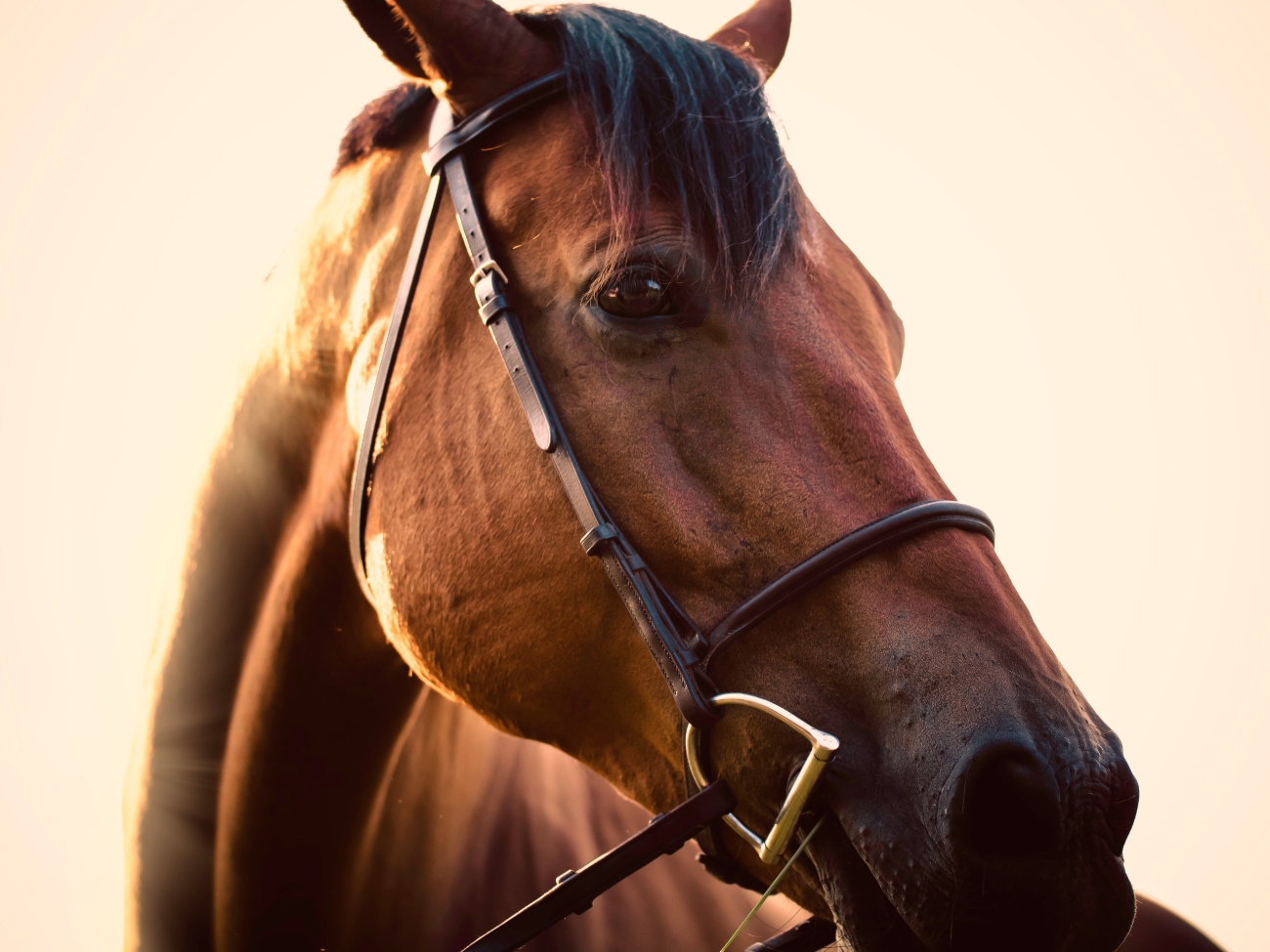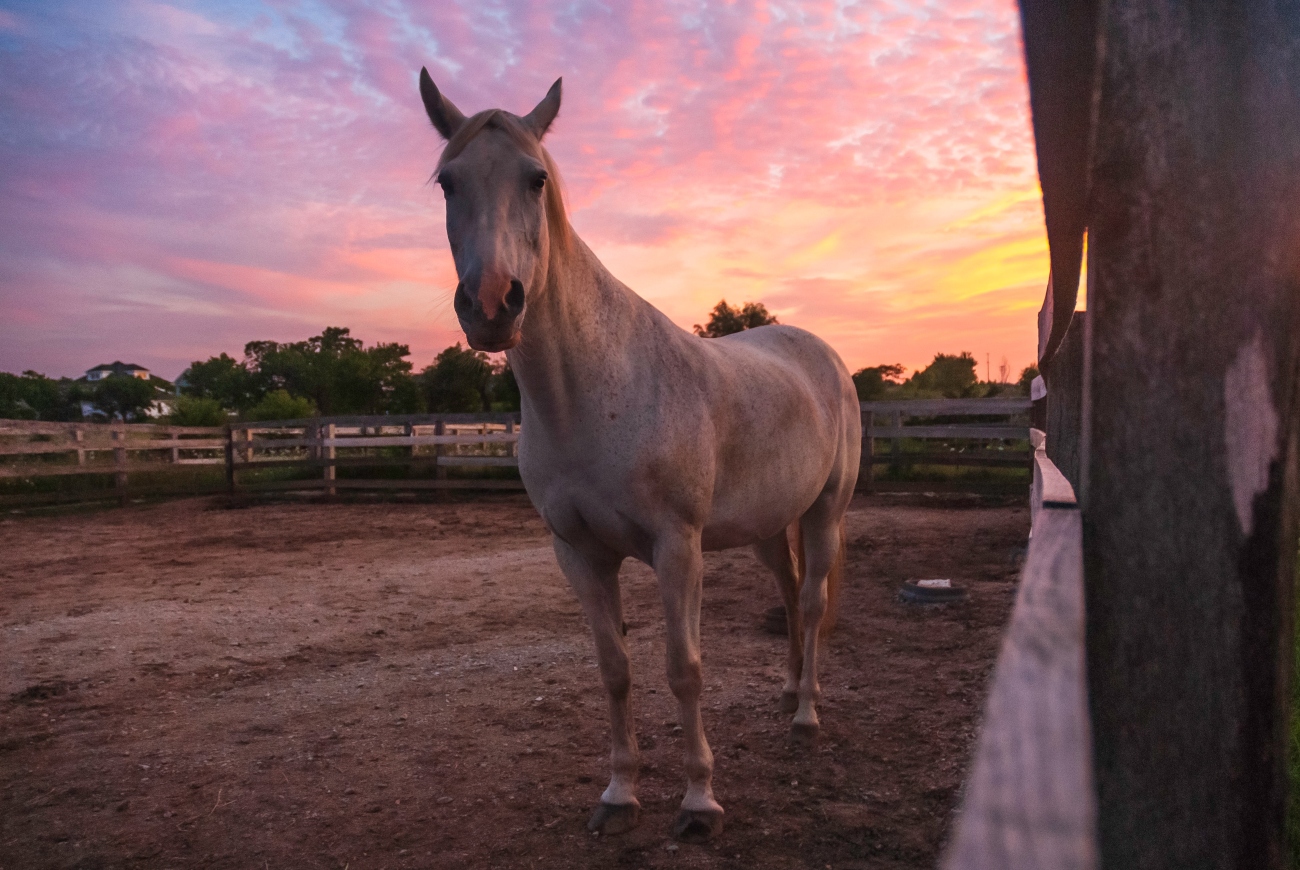Gastric ulcers are a very common problem for horses, but that doesn’t make them any less worrying or painful. Ulcers are very treatable, but the signs can be difficult to spot. Let’s look at what causes equine gastric ulcers and what you should do if you think your horse is suffering.
Veterinary treatment for horses can easily run into the thousands of pounds. Make sure you protect yourself from unexpected vet bills with specialist horse insurance from Equesure.

Why do gastric ulcers develop?
Horses are naturally grazing animals, and their digestive systems are built for this trickle feeding. A horse’s stomach secretes gastric acid throughout the day, helping to break down the steady intake of forage. In the wild, horses can graze for up to 18 hours a day.
Even with the most attentive owner in the world, domesticated horses who live in stables will not be able to eat in this way, typically being fed two or three times per day. Between feeds, the horse’s stomach acids will continue to flow into an empty stomach, which can result in damage to the non-glandular lining (gastric mucosa).
A horse’s stomach has an upper part and a lower part. The upper part is a non-glandular area where hydrochloric acid is made. There are also other acids such as pepsin, bile acids and organic acids. The lower region is constantly exposed to this hydrochloric acid and is protected against its effects.
Ulcers tend to form in the upper, non-glandular part of the stomach. This type of ulcer is known as a squamous ulcer (Equine Squamous Gastric Ulcer or ESGUS). Exposure to stomach acids irritates the tissues of this part of the stomach and can cause lesions to develop.
Ulcers in the lower part of the stomach are glandular (Equine Glandular Gastric Ulcer or EGGUS). These are less common, mainly being found in very young or older horses.
Racehorses and high-performance horses are particularly susceptible to ulcers, with between 80-100% of horses in training developing them at some point. However, they are also common in other categories of horse and pony, with around 60% of all equines developing them at some point.
What are the signs of a gastric ulcer?
Gastric ulcers can be tricky to spot because the symptoms can be vague. Horses do not always show obvious outward signs so it is important to watch for any slight change in temperament. Ulcers cause a horse discomfort so if something suggests this to you, ask your vet to check it out.
Particular symptoms include:
- Irritability or aggression
- A change in behaviour at feeding time
- Poor appetite
- Weight loss or poor body condition
- Low energy
- Poor coat
- Hunching up
- Grinding teeth
- Biting the crib
- Recurrent or acute colic
- Diarrhoea
- Pot-bellied appearance
- Poor performance
As any experienced horse owner will tell you, all these symptoms can be signs of other conditions and many could be down to a horse simply having a bad day. If your horse has several of these symptoms or they persist, call your vet. To diagnose gastric ulcers, the vet may carry out a gastric endoscopy to look inside your horse’s stomach. Your vet bill may be covered by your horse cover.
What increases the risk of a gastric ulcer?
Gastric ulcers are not just about how often a horse feeds. The feeding regime interacts with other factors to influence the chance of an ulcer developing.
Key factors include:
Galloping causes the acid in the horse’s stomach to splash around, hitting the squamous mucosal wall. Exercise also inhibits gastric emptying which traps the acids in the stomach. This means that vigorous exercise can increase the risk of ulceration.
Horses are designed to graze continually, and their bodies produce gastric acid to facilitate this. When horses are actually eating, the chewing action stimulates production of saliva, which acts as a buffer against stomach acids. Horses who eat less often lack this buffer and are therefore more susceptible.
Certain drugs can interfere with a horse’s natural mechanisms for protecting the mucosa of the stomach. This includes non-steroidal anti-inflammatory drugs (NSAIDS) and cyclooxygenase inhibitors (COX).
The acidity level of a horse’s stomach is impacted by diet, as fermentation of food produces volatile fatty acids. A diet that is high in starches such as oats to supply high levels of energy can contribute to the development of ulcers.
Gastric ulcers are more likely to develop at a time when a horse is stressed, for example when a horse has to be isolated so another condition can be treated, or when a horse has low appetite due to another condition. Other stressors include a change in environment or being transported. Read our tips on how to keep your horse calm during travel now.

How are gastric ulcers treated?
There are a number of different treatments for addressing equine gastric ulcers, depending on the severity of the problem and other factors. Vet treatment can be expensive, especially if a prolonged course of treatment is required. Make sure you have the right insurance for your horse to protect you against unexpected bills.
Omeprazole is a key drug which a vet may prescribe to suppress gastric acid production, allowing the stomach tissue a chance to heal. This is the treatment of choice for both ESGUS and EGGUS.
For ESGUS, a vet may recommend mucosal protectants to line the stomach, or antacids to reduce acid levels in the short term. A nutritional supplement may be given to help promote good gut health and the diet may be adjusted to introduce higher levels of roughage to reduce acidity.
For EGGUS, sucralfate or pectin-lecithin may be given to promote healing and reduce inflammation, while antibiotics might be needed if infection is suspected. Again, nutritional supplements and increased roughage might be recommended to help the horse return to health.
Top tips on how to avoid equine gastric ulcers
Just because gastric ulcers are very common in horses, this doesn’t mean they are inevitable. There is plenty you can do to reduce the risk that your horse will develop this uncomfortable and unpleasant problem.
- Reduce the amount of starch in your horse’s diet
Avoid or reduce cereal grains that form volatile fatty acids, such as barley, sorghum, corn and oats. Starch intake should be less than 1g per kilogram of bodyweight per meal and less than 2g per kilogram of body weight per day. If you do need to feed grains, spread the feed throughout the day.
Spreading feeds throughout the day helps to avoid your horse going for long periods of more than six hours without feeding.
- Make sure you use high quality hay
Not all hay is equal. Good quality hay has a prebiotic effect, supporting gut health and a healthy microbiome with good microbial fermentation. Different types of hay offer different nutrients, so ensure you understand your horse’s needs when choosing.
- Offer continuous foraging
This is not always practical or affordable, but where possible a horse should be able to forage throughout the day. A slow feed hay net (double netted or with small holes) will help to prevent horses from eating too many calories and gaining excess weight.
- Include plenty of fibre in the diet
A diet with plenty of roughage will help to keep your horse healthy. Including chopped alfalfa will buffer stomach acid and help to prevent ulcers.
- Provide constant access to water
Water dilutes gastric juices and lowers the acidity in the stomach. It also helps to keep food moving through the gut. Ensuring your horse has access to water for intermittent drinking through the day can help avoid ulcers forming.
- Reduce or eliminate anti-inflammatory drugs
Taking anti-inflammatories (NSAIDs) increases the risk of a horse developing ulcers. Obviously, there are times when you will need to give this treatment, but beware of the risks and only administer when truly required. Your vet might opt to give omeprazole along with the NSAID to reduce hydrochloric acid in the stomach.
- Make transportation as calm as possible
Being transported is a major stress factor for horses. Avoid unnecessary transportation and provide hay or haylage for consumption during the journey.
Horses who exercise little and often are less likely to develop ulcers than those who are worked hard, especially if the latter are kept in stables for prolonged periods.
- Limit the number of days of exercise per week
Glandular ulcers are more likely in horses that exercise on more than five days per week – a study found that racehorses working on six or seven days a week had a tenfold increase in glandular disease.
- Exercise in the afternoon
Riding first thing in the morning is not a great idea, as this is when your horse is likely to have an empty stomach. If you exercise in the afternoon after your horse has been grazing, this will reduce the risk of ulcers forming.
- Feed your horse before exercise
Allowing a horse access to forage shortly before exercise will help to ensure there is some fibre in the stomach to soak up stomach acid and prevent it from sloshing onto the susceptible part of the stomach.
- Offer forage during grooming and tacking up
The closer you can come to providing a stream of forage, the better. Provide haynets in the stables and piles of hay in the field to encourage a natural feeding pattern of moving and grazing. This will also extend the period your horse is eating, especially overnight.
- Let your horse mix with other animals
Horses are sociable beings, mixing with other horses can help to keep them calm and prevent stress-related ulcers. Mixing horses without a rug enables them to engage in relaxing grooming activities.
- Use electrolyte pellets rather than paste
Dosing horses with electrolytes can help to maintain the right balance of salt and minerals, especially in hot and humid conditions. However, electrolyte paste is associated with ulceration so opt for pellets that can be mixed with your horse’s feed instead.
Some horse owners swear by herbal remedies to help ulcer recovery, in combination with dietary changes and treatments recommended by a vet. Herbs used include camomile flower, meadowsweet, devil’s claw root, marshmallow, and mugwort. Consult your vet or herbalist before giving your horse any herbal supplements.

Managing your horse’s stress
Stress can be a major factor in the development of gastric ulcers in horses. Even if your horse has never had an ulcer, as a caring owner you will want to make sure your equine is as calm and relaxed as possible.
Like most of us, horses can be unsettled by unexpected changes or sudden events. Developing a steady routine for your horse and introducing any changes slowly where possible will help to reduce stress. Feeding, exercise and management should all happen according to an established pattern.
Uncomfortable tack, rugs, boots and shoes can cause a horse to become unhappy and distressed. Making sure that these fit well and are maintained properly can prevent this from becoming a problem.
It’s also important to consider your horse as an individual. Some horses like to socialise a lot, others prefer their own company. Some like plenty of space, others are happy with a cosier stall. Horses are very intelligent creatures, so providing some entertainment such as a ball, hidden food or a haynet with small holes will help to keep their mind engaged and prevent boredom and anxiety.
Although predictability will help to stave off stress, you also need some fresh stimulation sometimes, such as a new riding task or simply walking your horse in-hand for once. Giving your horse an element of choice can also improve mood, for example by putting two buckets of water in the stable or splitting food rations into multiple nets.
Invest in horse insurance today
Specialist insurance will help you cover the costs of treatment associated with gastric ulcers.
Equine insurance means your vet bills are taken care of, so you can treat the problem promptly and avoid the worry of facing a sudden bill for care and medicine.
Why not get a quote for horse insurance from Equesure today?






